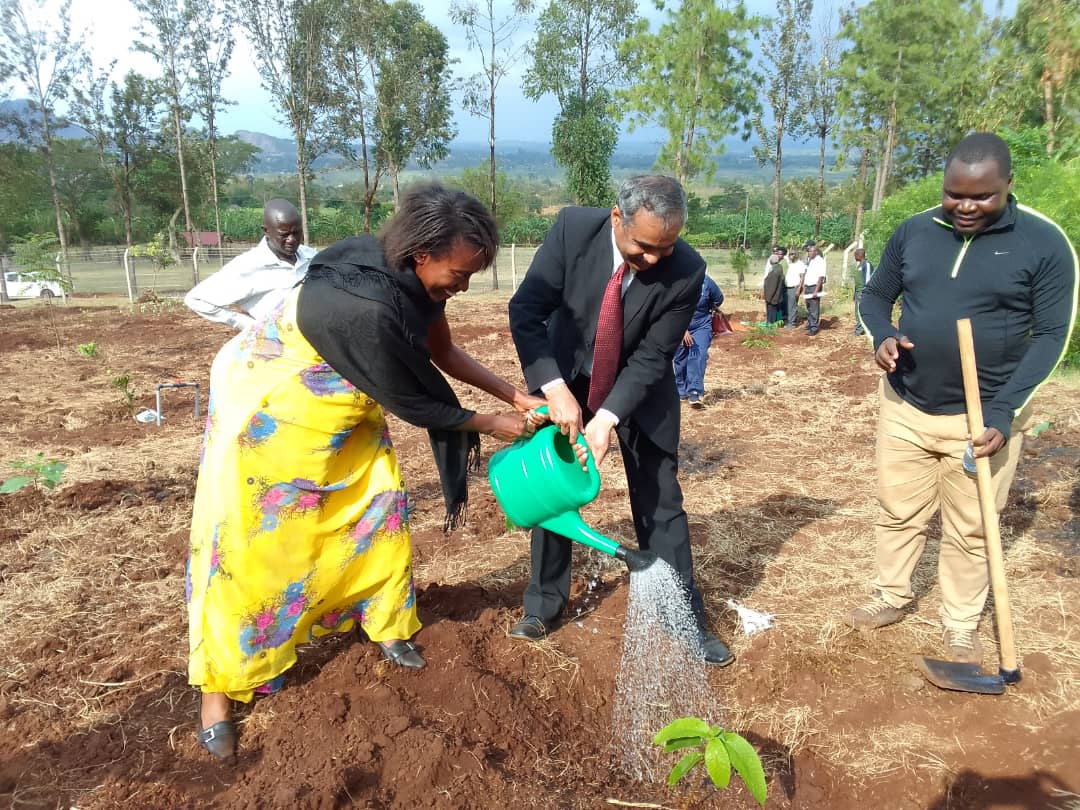Govt, UNDP Call for Concerted Efforts to Conserve Wildlife
March 9, 2023

A photo montage showing Hon. Tom Butime, Minister of Tourism, Wildlife and Antiquities, and other partners inspect exhibitions during the World Wildlife Day celebrations.
Uganda joined the rest of the world to commemorate this year’s United Nations World Wildlife Day on 3 March 2023.
Under the theme, “Partnerships for wildlife conservation”, this year’s national celebrations were presided over by Hon. Tom Butime, the Minister of Tourism, Wildlife and Antiquities, at King George Stadium in Tororo district.
Speaking during the celebrations, Hon. Butime called for the diversification of tourism products and urged the populace to leverage infrastructure developments such as roads to harness emerging opportunities in the tourism sector.
Hon. Tom Butime speaks during the World Wildlife Day celebrations at King George Stadium, Tororo district.
In line with the theme, he emphasized the importance of collaboration to conserve nature, “World Wildlife Day 2023 will draw inspiration from past successful partnerships, serving as a springboard for the necessary future work required to bring us into a sustainable partnership with nature,” Hon. Butime said.
Mr. Thangavel Palanivel, a Senior Economic Advisor at UNDP Uganda who represented the Resident Representative Ms. Elsie Attafuah, applauded Government efforts to reduce the loss of Uganda’s wildlife, including the passage of the Wildlife Act 2019 which has improved wildlife conservation.
Mr. Thangavel Palanivel, Senior Economic Advisor at UNDP Uganda, speaks during the World Wildlife Day celebrations.
Increasing economic benefits from wildlife
“UNDP commends the Government for developing the National Biodiversity Finance Plan which is guiding efforts to achieve optimal and sustainable financing for biodiversity conservation; and the National Strategy for Management of Human-Wildlife Conflicts which is contributing to harmonious co-existence with wildlife,” he said.
Mr. Palanivel also commended Government efforts to test the conservancy concept in areas surrounding Kidepo Valley National Park, Murchison Falls National Park and Lake Mburo National Park to increase economic benefits from wildlife to local communities and landowners through ecotourism.
He also called for more efforts to conserve wildlife, “I, therefore, call on all of us to commit to doing more in developing and promoting growth models and practices that accommodate both human well-being and long-term conservation of wild flora and the species they shelter,” Mr. Palanivel said.
Strengthening Uganda’s wildlife conservation efforts
UNDP has strengthened the capacity of the Uganda Wildlife Authority (UWA) to effectively undertake research, prevent poaching and encroachment, and monitor protected areas.
In collaboration with UWA, UNDP contributed to reduction in biodiversity threats in the 655,700-hectare Kidepo Critical Landscape thanks to the implementation of sustainable use management practices for wildlife resources, construction of a community-owned eco-lodge in the Karenga Conservancy and strengthening protected area management capacities.
We also collaborated with the Italian government, the Catholic Church and UNESCO to conserve biodiversity and wildlife in the Mount Moroto central forest reserve to promote nature-based solutions in Karamoja sub-region. It is envisaged that designating Mt. Moroto as a Man and Biosphere (MAB) site will improve human livelihoods (the people) and protect ecosystems (the planet) for human security.
Restoring wetlands and associated catchments
Recently, the UNDP Uganda Accelerator Lab and the National Forest Authority co-created a real-time data visualization platform to track changes in forest cover and inform the design of the most appropriate interventions. It is hoped that this platform will increase understanding of human and wildlife migration patterns, track urban development and inform forest management and urban planning. It could also provide credible information to help with resource mobilization and allocation decisions, such as through policy changes and fiscal incentives.
Local communities and indigenous peoples are the source of innovative and effective solutions for conserving Uganda’s wildlife because they are the primary users and guardians of the country’s ecosystems. As a result, UNDP is strengthening their role in biodiversity protection, restoration and management. In collaboration with the Government of Uganda, UNDP provided skills and tools to women and youth in the Queen Elizabeth National Park area so that they can participate in and benefit from conservation efforts in the long run.
In collaboration with the government, UNDP is also actively involved in the restoration of degraded biodiversity areas, such as wetlands and associated catchments. Some 38,941 hectares of degraded wetlands have been restored in the last four years, and 6,655 hectares of degraded catchment have been rehabilitated.

UNDP staff plant a tree at the Keserena model farm. Trees and woodland ecosystems provide clean air, flood protection and carbon storage, all of which are essential in slowing climate change and mitigating its effects.
About World Wildlife Day
The United Nations General Assembly (UNGA) designated 3 March as UN World Wildlife Day on 20 December 2013, to celebrate and raise awareness of the world’s wild animals and plants. The UNGA resolution also designated the Convention on International Trade in Endangered Species of Wild Fauna and Flora (CITES) Secretariat as the facilitator for the global commemoration of this special day on the UN calendar for wildlife.

 Locations
Locations